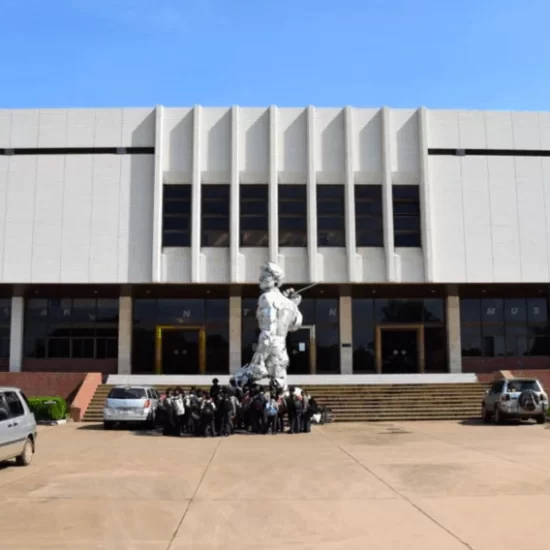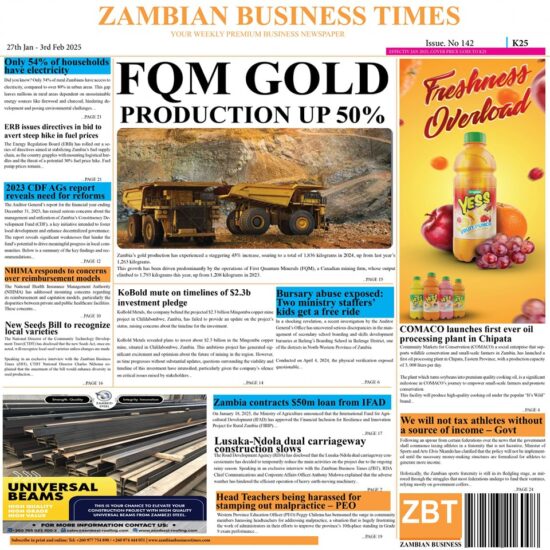Editorial
It’s very clear that the mass media landscape, both social and mainstream media in Zambia, being a former British colony still has a leaning towards propagating Western (Western Europe and USA) views, ideology, and interests to Zambian citizens, sometimes at the expense of genuine local interests.
For instance, when global cable and digital TV was introduced in Zambia by Naspers, the South African owners of DSTV, western news media like BBC and CNN became available to the wider community of Zambians, further spreading and propagating Western views, interests, and ideologies.
DSTV thrived and found it easy as they piggybacked on the already existing national broadcaster, Zambia National Broadcasting Corporation – ZNBC assets. ZNBC was hoodwinked into carrying their eventual nemesis DSTV adverts by even show casing some one hour DSTV viewing that gave them a free inroad into the Zambian market.
A special purpose vehicle – Multichoice was formed with ZNBC getting a sizeable shareholding, but the national broadcaster lost its number one position choice among the middle class and elites of Zambia, a position now looks lost forever.
But when Chinese-owned Star Times – Topstar used the same model of riding on national broadcaster – ZNBC assets and even went deeper by adding the refurbishment and construction of provincial television studios in all the 10 regions of Zambia, it’s today not uncommon to hear or read western media and views that ZNBC has been taken over by the Chinese. Today, Topstar has even ceased to advertise let alone promote its offering.
The battle for the control of Africa’s and in effect Zambia’s rich natural resources has always played out globally especially because of Copper, a global commodity of significance now more than ever as the world embarks on green energy and becomes more digital.
For students of history, the infamous Berlin conference which took place in Europe and specifically Germany were African territories and its vast resources were being shared like confetti among Western European countries is a stark example on how Africans have been passengers on matters involving their own resources and destiny.
At that fateful discussion, the biggest beneficiaries of the Berlin conference were the English, the French, the Spanish, the Germans, and the Portuguese. The Belgians also got a lion’s share, the massive and perhaps the richest country on earth by resources – the Congo, today referred to as the Democratic Republic of the Congo.
Suffice it to say that Africa was being divided in a conference were there was no single African leader or representative. The result was the blighted and massive plunder of Africa’s natural resources in what has come to be known as Africa’s colonial era.
It’s difficult for us to write more about this 1885 Berlin conference because whatever was discussed and published can never really be confirmed with certainty as there was no single African leader with African interests present to give his account of what really transpired.
What is visible though is that Africa went through a period of massive social and economic regression and under-development but the Western countries become even more richer in financial and economic terms.
Africa and Zambia despite importing some level of industrial activity, recorded deteriorated race relations, abuse of human rights with the ultimate example of apartheid in South Africa which to-date remain as a historical scar on this colonial era.
Double standards of the west on Zambia’s debt situation
The problem that Zambia continues to have is not developing its own set of authentic ideology, strategies and only tweaking them when necessary to suite the changing world.
Zambia’s national development plans are subject to heavy influence by either western or eastern ideology via some rent seeking up-for-sale politicians, foreign sponsored non-governmental organizations and various non-national interest groups who mostly carry the agenda of their financiers and pay masters.
If it’s the International Monetary Fund – IMF and the World bank, we wonder how they still have the face to advise Zambia despite the massive failure and social hardships inflicted on Zambians of their sponsored Structural Adjustment Programs – SAP, first from 1983 to 1991, then from 1991 to about 1998.
Zambia which had built a decent base for local manufacturing and industrial base embarked on wanton liberalization of the markets on the advice of these Breton Woods institutions to an extent where today, cheap imports are dumped into the country killing any form of developing local innovation and businesses, such that even small items like toothpicks are today being imported.
Post these failed IMF/World Bank-sponsored SAPs, Zambia found itself as a highly indebted country and landed in the Highly Indebted Poor Countries Initiative – HIPC, the country had accumulated high-interest debts from mostly Western lenders way beyond its ability to pay back.
Its industrial base was privatized and fire-sold by sponsored politicians and their conspirators to mostly western companies at giveaway prices, with Zambia reverting back to square one as far as import substitution is concerned.
That is how most African and developing countries which included Zambia lobbied for this debt write-off on moral grounds as it was argued that the conditions precedent, interest rates, and payment terms given by mostly the IMF and the World Bank, and other bilateral and multilateral lenders were unjust and crippled the chances of Zambia’s economy ever paying back and becoming economically independent.
Therefore, it shows that while it was okay for Western countries to pile up debt and lend to Zambia beyond the country’s ability to pay back, today the Western countries are the ones at the forefront depicting that the Chinese debt is an alternative source of funding will make Zambia’s debt repayments impossible or unsustainable?
The question is, are these questions being asked for the West’s own interests? or the west’s own desire to contain the East? or Zambia’s interest? From history, it would appear that it’s more from their own interest’s point of view.
Just last month (August 2018), after the International Monetary Fund – IMF produced a report that said that Zambia was sliding into a “debt distress” situation, we saw the Minister of Finance, Margerate Mwanakatwe sign a Euro 110 million credit facility with the European Investment Bank as financing for the rehabilitation of the great north road stretch from Mpika to Chinsali.
Now, if a country is sliding into debt distress, why would a responsible lender who postulates to be concerned at the debt levels in Zambia proceed to sign off this facility? Is Zambia’s debt level being used as a thumb screw?
The IMF itself has a pending credit facility of about USD1.25 billion packaged as a balance of payment support that they want to book with Zambia, since this is a balance of payment support, these funds will most likely not even touch the Zambian economic system.
The IMF lending and their conditions are a subject of debate in other Afro countries such as Ghana, where the promise of stabilization of the economy after the West African country signed off the Extended Credit Facility – ECF for about USD 955 million did not deliver the much-hyped promises of economic stability.
So for the uninitiated, let’s be clear that the IMF program and facility is not a silver bullet to Zambia’s various social and economic challenges, but one of the options available on the table.
It’s important that Zambians awaken to the fact that the IMF, the World Bank, or indeed other lenders have their own interests which at most times may be at variance with Zambia’s long-term interests. It therefore calls for sober negotiations for any alternative financing package that is put on the table.
WHY ZAMBIA SHOULD DEFINE ITS OWN INTERESTS AND NEGOTIATE OR SEEK ITS OWN ENDS
Zambia as a sovereign country has its own unique history, its own special cultures, its own unique peoples with their own unique socio-economic aspirations. These are what must be funneled and sieved into what the national and collective long-term national interests are.
After all, the solutions to Zambia’s economic and social challenges are peculiar and not a one size fits all. If Zambia is clear of what its key national interests are, then there should be consideration for selecting which countries to be friends with, which financing options will be most ideal and most efficient in terms of economic and social benefits and costs.
We as ZBT are not in any way suggesting that Chinese debt is better than Western debt, no, China also has its own special interests. As Zambians, we must be fully aware of this so that negotiations are done with this aspect in mind.
The time for giving unquestionable trust to any party on the negotiating table is gone, It’s the meeting halfway of these interests that should determine who the country will go with and sign up deals for Credit facilities or indeed obtaining foreign remedies for local challenges.
Some sophisticated lenders and countries package debt as grants, but as a country and people, it’s high time we shrugged off the scales of naivety and accept that these so-called grants or aid have strings attached, there is SIMPLY no free lunch in this world. Even grants are utilized to extract concessions at a letter date, grants and aid are also used to influence public policy which in the long run ends up benefiting the grant or aid giver.
Now that it’s clear that there is an alternative to obtaining financing between the West and the East, between bilateral and multilateral institutions, its gives Zambia the option to look at its own long term interests and make deals that are in line with those interests in mind.
Let’s avoid being easily swayed by the West’s propaganda against the East (or Chinese investment and funding) or vice-versa that the Chinese do not interfere in local politics, all these are mere selling points for their engagement and strategic goals.
Zambia should equally recognize that China has its own national and global interests to pursue and Zambia should not make deals or contract debt emotionally, desperately, or because it’s been offered.
The country needs to have its own authentic strategy and plans that should inform the quest for amounts and targeted returns on any debt, grant, aid, or whatever form of financing is contracted.
Zambia’s current leaders therefore should utilize this unique situation where there are more options today to extract the best possible financing deals for the long-term interest of Zambia and its future generations.
As a nation and state, it’s high time we acknowledge that only Zambians will develop Zambia, at the household level, only the family heads or family members can develop your household. Putting hope in another foreign government, foreign institution or your neighbor or your friend or your relative to develop your household is simply leaving yourself and your future generations open to a LIFETIME OF MANIPULATION.
The above is the ZBT editorial of September 2018, which applied to the then-PF administration led by Edgar Lungu, and is still applicable to the current UPND administration led by Hakainde Hichilema






